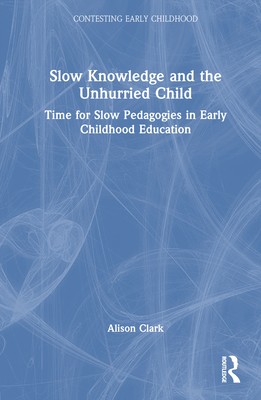
- We will send in 10–14 business days.
- Author: Alison Clark
- Publisher: Routledge
- ISBN-10: 036750880X
- ISBN-13: 9780367508807
- Format: 15.4 x 23.8 x 1.6 cm, kieti viršeliai
- Language: English
- SAVE -10% with code: EXTRA
Reviews
Description
This book explores the relationship with time in early childhood by arguing for the valuing of slow pedagogies and slow knowledge. Alison Clark points to alternative practices in Early Childhood Education and Care that enable a different pace and rhythm, against the backdrop of the acceleration in early childhood and the proliferation of testing and measurement. Diverse approaches are explored to enable an 'unhurried child' and less hurried adults.
Slow Knowledge and the Unhurried Child is divided in three parts. Part 1, Reasons to be slow, looks at the pressures in Early Childhood Education and Care to speed up and for children to be 'readied' for the next stage. The book then explores different relationships with time for young children and educators. Part 2, Slow pedagogies and practices, explore some of the forms slow practices can take including outdoors, in the studio, in everyday routines, through stories, in pedagogical documentation and in 'slow' research. Part 3, Moving forward, shows what a 'timefull' approach to ECEC can look like, whilst debating the challenges and possibilities that exist.
The book serves as a catalyst for urgent discussion about the need to slow down in early childhood education and teacher education and explores case studies of where slow early childhood education are already happening. It will be a key reading for researchers, practitioners and policy-makers about the relationship with time in early childhood and the importance of taking a longer view.
EXTRA 10 % discount with code: EXTRA
The promotion ends in 22d.14:10:43
The discount code is valid when purchasing from 10 €. Discounts do not stack.
- Author: Alison Clark
- Publisher: Routledge
- ISBN-10: 036750880X
- ISBN-13: 9780367508807
- Format: 15.4 x 23.8 x 1.6 cm, kieti viršeliai
- Language: English English
This book explores the relationship with time in early childhood by arguing for the valuing of slow pedagogies and slow knowledge. Alison Clark points to alternative practices in Early Childhood Education and Care that enable a different pace and rhythm, against the backdrop of the acceleration in early childhood and the proliferation of testing and measurement. Diverse approaches are explored to enable an 'unhurried child' and less hurried adults.
Slow Knowledge and the Unhurried Child is divided in three parts. Part 1, Reasons to be slow, looks at the pressures in Early Childhood Education and Care to speed up and for children to be 'readied' for the next stage. The book then explores different relationships with time for young children and educators. Part 2, Slow pedagogies and practices, explore some of the forms slow practices can take including outdoors, in the studio, in everyday routines, through stories, in pedagogical documentation and in 'slow' research. Part 3, Moving forward, shows what a 'timefull' approach to ECEC can look like, whilst debating the challenges and possibilities that exist.
The book serves as a catalyst for urgent discussion about the need to slow down in early childhood education and teacher education and explores case studies of where slow early childhood education are already happening. It will be a key reading for researchers, practitioners and policy-makers about the relationship with time in early childhood and the importance of taking a longer view.


Reviews